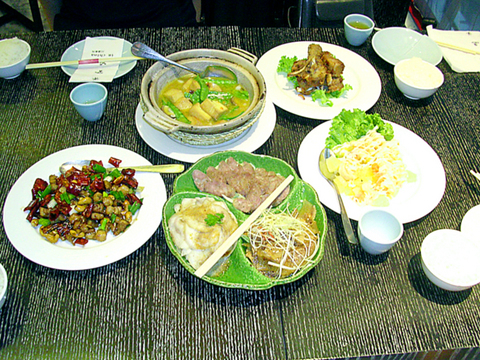It's difficult to find a place that serves authentic Sichuan cuisine. Most local restaurants either manage to nauseate their customers with excessive greasy food, or have attempted to destroy their taste buds by adding too much spice. True, Sichuan food is known for its tongue-numbing and highly flavored dishes, but spicy food that dissolves your stomach is pushing it.
IR China, a Sichuan restaurant on the fourth floor of the Taipei 101 building, knows where to draw the line. I went as part of a group of four and we ordered the set meal, which gave us a taste of everything for around NT$2,500. The set meal includes six signature dishes, a soup, and a dessert of choice.
In summary, the steamed codfish was average, the stewed crab "huang" with bean curd was interesting, and the deep fried shrimp balls with pineapple was exquisite, if one can stomach Taiwanese mayonnaise.

PHOTO: GAVIN PHIPPS, TAIPEI TIMES
The South China pan offered some more exotic tastes, as it included southern Chinese sausage, pig skin, and sliced beef gizzard.
But what truly distinguished the place were the deep fried spare ribs with garlic sauce and the diced chicken with paprika. The ribs were ridiculously tender and many would agree, after having eaten in most of the Sichuan places in Taipei, IR China makes the best kung pao chicken in town.
Dessert was an interesting affair. We had a choice of braised black glue rice, and something that sounded much worse. In the end, some of us gulped down a bowl of dessert that was translated as braised white fungus. It tastes better than its name would suggest.
IR China also offers more than 10 kinds of tea to go with your meal, an assortment of tropical fruit drinks, and alcoholic beverages (mostly beer). In addition to the exceptional food and pleasant service is the location of the restaurant, which has a pleasant atmosphere and competent wait staff. Making a reservation before the meal is strongly advised, so that you can secure a table by the window. The tables near the exit are located right beside the walkway, where shoppers can pass by and look in on your meal. The view from the window is not great, but the food will more than compensate for that.
So if you're shopping near 101 and are looking for tasty Chinese food at a reasonable price, then be sure to stop at IR China. My only criticism is that the restaurant needs better English translations on their menus to go with their great food.

April 28 to May 4 During the Japanese colonial era, a city’s “first” high school typically served Japanese students, while Taiwanese attended the “second” high school. Only in Taichung was this reversed. That’s because when Taichung First High School opened its doors on May 1, 1915 to serve Taiwanese students who were previously barred from secondary education, it was the only high school in town. Former principal Hideo Azukisawa threatened to quit when the government in 1922 attempted to transfer the “first” designation to a new local high school for Japanese students, leading to this unusual situation. Prior to the Taichung First

The Ministry of Education last month proposed a nationwide ban on mobile devices in schools, aiming to curb concerns over student phone addiction. Under the revised regulation, which will take effect in August, teachers and schools will be required to collect mobile devices — including phones, laptops and wearables devices — for safekeeping during school hours, unless they are being used for educational purposes. For Chang Fong-ching (張鳳琴), the ban will have a positive impact. “It’s a good move,” says the professor in the department of

On April 17, Chinese Nationalist Party (KMT) Chairman Eric Chu (朱立倫) launched a bold campaign to revive and revitalize the KMT base by calling for an impromptu rally at the Taipei prosecutor’s offices to protest recent arrests of KMT recall campaigners over allegations of forgery and fraud involving signatures of dead voters. The protest had no time to apply for permits and was illegal, but that played into the sense of opposition grievance at alleged weaponization of the judiciary by the Democratic Progressive Party (DPP) to “annihilate” the opposition parties. Blamed for faltering recall campaigns and faced with a KMT chair

Article 2 of the Additional Articles of the Constitution of the Republic of China (中華民國憲法增修條文) stipulates that upon a vote of no confidence in the premier, the president can dissolve the legislature within 10 days. If the legislature is dissolved, a new legislative election must be held within 60 days, and the legislators’ terms will then be reckoned from that election. Two weeks ago Taipei Mayor Chiang Wan-an (蔣萬安) of the Chinese Nationalist Party (KMT) proposed that the legislature hold a vote of no confidence in the premier and dare the president to dissolve the legislature. The legislature is currently controlled